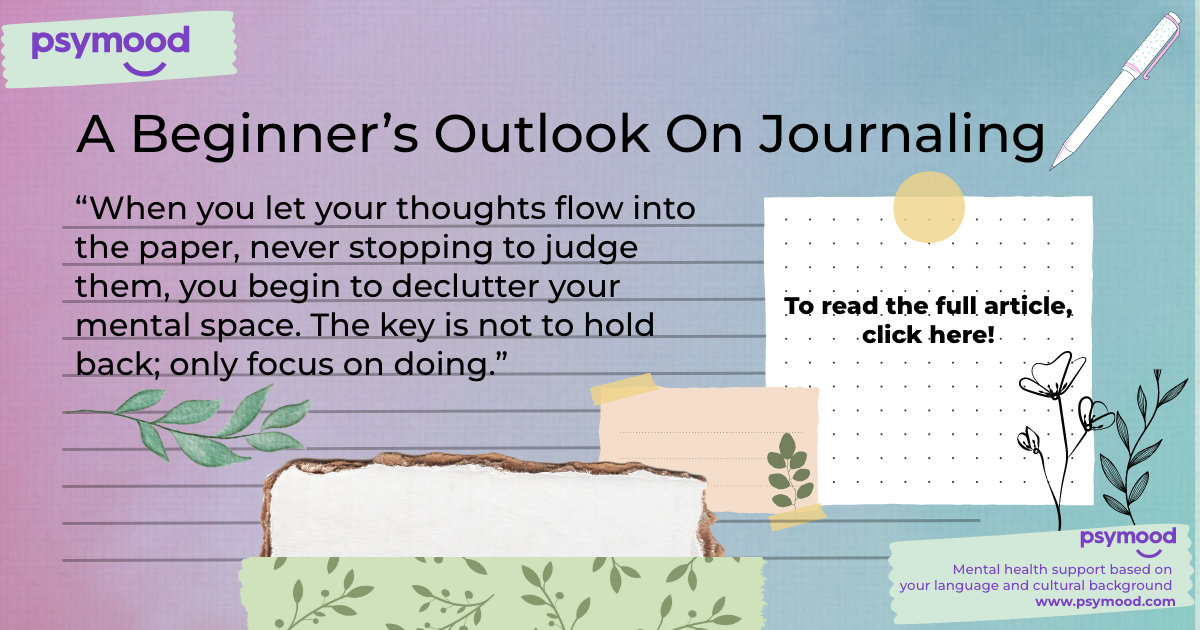A Beginner's Outlook On Journaling
Journaling can be an unknown and intimidating subject for some, however, it is a powerful enlightening tool that you can use for your mental health.
Have you noticed a commonality among characters who are shown journaling in all sorts of stories? Their sense of purpose is palpable. What’s more–have you noticed that those interesting people turn to their journals to deal with overwhelming situations?
And for you, esteemed reader, I hope you’ll discover firsthand the wonders of this habit. In the meantime, here’s some things you can anticipate.
It Clears Your Mind
Have you ever wondered why most teachers would want us to take notes during class? When we try to commit something to memory, we need to make associations with more of our senses. For instance, if you hear a word that interests you, you write it down; and now you remember both hearing and writing it. Similarly, enacting is the most effective way for an actor to learn a script.
As a species that has come so far using language and tools, it feels almost redundant to point out that the benefits of recording things that are in our minds are countless. And still, we underestimate its full amazingness.
What–do you think–has stopped us from journaling to the fullest potential?
In this day and age, you’re assumed to be surrounded by devices designed to entrap your attention. As you get more addicted to the perpetual feed of reassuring content, the temptation to keep gazing back at your screen is relentless. If I were to guess, I’d say your biggest hindrance is this as well.
The everyday problem is, when you finally find sleep after staring at your screen for over an hour in bed, the quality of your sleep just keeps getting worse. To remedy this, I’d recommend you make it a point to turn off and put away all those screens before proceeding.
Now then, what can you expect to change if you start journaling?
You Open Up
There’s no shame in recognizing when it feels impossible to express yourself. Sooner or later, we’ll find something hard to put into words–let alone speak about it. If you’re facing an unresolved mess that you can’t decide how to approach, you should consider letting that hand loosely on a piece of paper.
When you let your thoughts flow into the paper, never stopping to judge them, you begin to declutter your mental space. The key is not to hold back; only focus on doing.
After all, people “think“ with their bodies too, so allowing your hands to release what burdens you have can help you see your problem from a healthier distance.
Your Stress, Anxiety, and Depression Diminish
Your journal is a safe space to express with no judgment of grammar, repeating words, messy writing/typing, length and topics. Letting the overthinking and overanalyzing thoughts have an outlet reduces stress, anxiety and depression.
You Get in Touch with Yourself
The thought process of writing ideas down, for posterity or not, gives you a lot of personal insight. You start seeing your ideas take form outside of your head, providing a broader perspective. In a matter of days, this process will make you profoundly aware of the difference it makes to let your thoughts materialize.
At times, you’ll need journaling as a simple act of catharsis. At others, you’ll turn to it to help you tackle overwhelming decisions. Bear in mind; it even helps to journal about things unrelated to that dilemma–all thanks to the lingering clarity of mind you attain!
Journaling Prompts to Stay Constant
If not knowing where to start could stop you from staying strong and consistent with your journaling, here are some reflection points to nudge you in the right direction:
- Share the most vivid and recent dream you can recall.
- Reflect on something you’re thankful for.
- Explain something you’re amazing at.
- How is your relationship with loved ones? Have there been any developments between you and them?
- Describe your favourite place.
- What was the last time you laughed?
- What worries you?
- Sketch something awesome/soothing/beautiful.
- What do you hope to achieve?
- What’s holding me back?
- How have you felt?
Start Journaling
As a fledgling journaler myself, my sincerest hope as I write these words is that you felt the excitement and depth that this habit brings. Don’t be bogged down by deciding where, when, and how you’ll decide to journal. Each medium and schedule will have their own benefits to them.
Happy journaling!
PsyMood is a digital tool designed to help you find the support you need in the language that you are most comfortable with. PsyMood considers cultural background, geographical location, interests, and personal needs, amongst other factors, to pair you with service providers for either online or in-person therapy sessions.
Check out our other blogs here!


.png)
.png)
.png)
Recent Comments